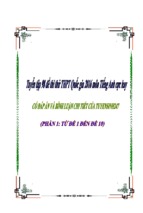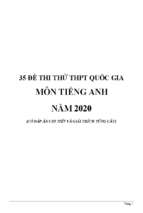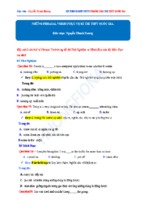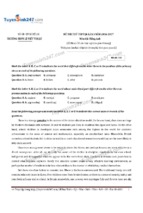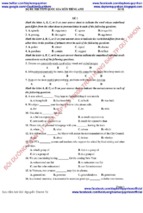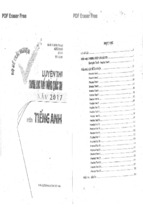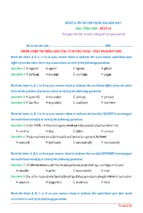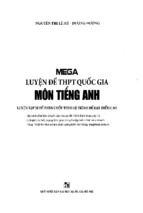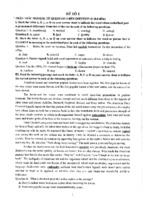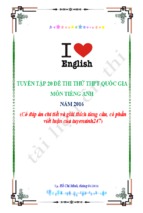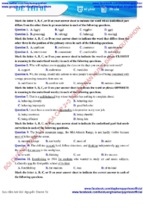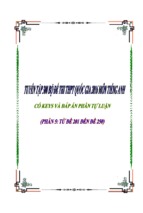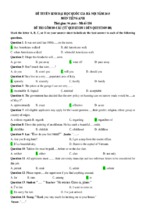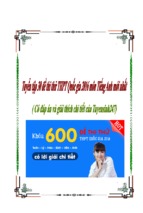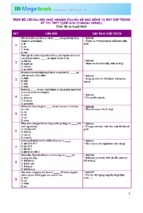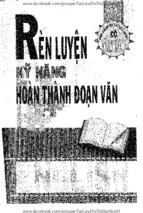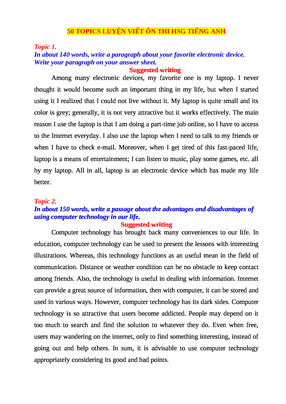ĐỀ THI THỬ SỐ 25
ĐỀ THI THỬ ĐẠI HỌC NĂM 2012
Môn: TIẾNG ANH; Khối D
Thời gian làm bài: 90 phút, không kể thời gian phát đề
ĐỀ THI GỒM 80 CÂU (TỪ QUESTION 1 ĐẾN QUESTION 80)
I. Mark the letter A, B, C, or D on your answer sheet to indicate the word whose main stress is
placed differently from that of the rest in each of the following questions.
Question 1
A. reindeer
B. engineer
C. pioneer
D. referee
Question 2
A. dangerous
B. marvellous
C. conspicuous
D. numerous
Question 3
A. establish
B. illustrate
C. intimidate
D. inheritance
Question 4
A. consequently
B. profile
C. initiate
D. project
Question 5
A. obedience
B. curriculum
C. benefactor
D. moustache
II. Mark the sentence (A,B,C or D) that is the best way to have a complete sentence with the
words given.
Question 6: provide/ your handwriting/ legible/ test scorer/ accept/ your answer
A. Providing with your legible handwriting, every test scorer must accept your answer.
B. Provided that your handwriting is legible, your answer will be accepted by any test scorer.
C. Providing your handwriting is legible, the test scorer does not accept your answer.
D. Provided for your legible handwriting, the test scorer has to accept your answer.
Question 7: New building / be / almost / twice / big / old one.
A. The new building is almost as twice big as the old one.
B. A new building is almost twice as big as an old one.
C. The new building is almost twice big the old one.
D. The new building is almost twice as big as the old one.
Question 8: you/ really/ be/ able/ dress/ yourself/ age.
A. You should really be able to dress yourself at your age.
B. You are really able of dressing yourself this age!
C. You have really been able of dressing yourself by your age.
D. You must really be able of dressing yourself in your age.
Question 9: No one / know / answer / teacher / question.
A. No one knows the answer of the teacher's question.
B. No one knows how to answer teacher's question
C. No one knows the answer to the teacher's question.
D. No one knows to answer the teacher's question.
Question 10: hilltop/ have/ good/ view/ our village
A. From the hilltop, our village can have a better view.
B. From the hilltop, our village can be well viewed.
C. From the hilltop, we can have a better view of our village.
D. The hilltop can make our village views better.
III. Mark the letter A, B, C, or D on your answer sheet to indicate the correct answer to each
of the following questions.
Question 11: My cousin obviously didn't _________ much of an impression on you if you can't
remember meeting him.
A. create
B. build
C. do
D. make
Question 12: The boy screamed for help but he couldn't _________.
A. hear him
B. make himself heard
C. make himself hear
D. make him heard
Question 13: If you __________ to my advice in the first place, you wouldn't be in this mess
now.
A. had listened
B. will listen
C. listened
D. listen
Question 14: The government stopped the local companies from importing fake milk powder
_________ of public health.
A. for the attention
B. on the safe side
C. to the best
D. in the interest
Question 15: ______ his good education, Taro knew little about Japan as he left Japan when he
was very young.
A. In stead of
B. With all
C. In place of
D. Along with
Question 16: ______ further rioting to occur, the government would be forced to use its
emergency powers.
A. Did
B. Were
C. Should
D. Had
Question 17: - Peter: How are you today?
- Susan: ____________
A. I feel like a million dollars.
B. I feel like a million stars
C. I feel your ears burning
D. I can feel it in my bone
Question 18: When you are learning a language at home, you can work at your own
__________
A. speed
B. way
C. mind
D. pace
Question 19: ________ in Paris before, he didn't know his way around when he took his family
there.
A. Not be living
B. Never having lived
C. Because he has lived
D. His not living
Question 20: - Henry: Well, it was nice talking to you, but I have to dash.
- Liz: ____________
A. OK, see you.
B. Yes, I enjoyed talking to you, too
C. Thanks! I will stop now.
D. Yes, It was.
Question 21: The factory is said _______ in a fire two years ago.
A. being destroyed
B. to have been destroyed
C. to have destroyed
D. to destroy
Question 22: By the end of this year my father _______ in this company for 12 years.
A. will work
B. will have been working
C. has been working
D. has worked
Question 23: A - “Would you mind giving me a hand with this bag?”
B - “ _____________________.”
A. Yes, I’ll do it now.
B. No, not at all.
C. Well, I’d love to
D. Yes, I am.
Question 24: Forget all and try your best next time - Lightning never _______ twice in the same
place.
A. strikes
B. attacks
C. beats
D. hits
Question 25: I must go to the dentist and ___________.
A. get my teeth taken care of
B. take care of my teeth
C. get my teeth to take care of
D. my teeth be taken care of
Question 26: His emotional problems _______ from the attitudes he encountered as a child, I
think.
A. stem
B. flourish
C. root
D. sprout
Question 27: Peter was born and brought up in Cornwall and he knows the place like the
_________.
A. nose on his face
B. back of his hand
C. hairs on his head
D. teeth of his mouth
Question 28: Tom: "I'm sorry. I won't be able to come".
Mary: “_______”.
A. Sounds like fun
B. Well, never mind
C. Oh, that's annoying
D. Great
Question 29: Rows and silences are ______ and parcel of any marriage.
A. package
B. stamps
C. packet
D. part
Question 30: It’s not in my nature to _______ over the price of something.
A. haggle
B. discuss
C. challenge
D. transact
Question 31: "Buy me a newspaper on your way back, _________?”
A. don’t you
B. can’t you
C. will you
D. do you?
Question 32: You ought to know that these buttons can’t be pressed__________ .
A. at no time
B. under any circumstances
C. under no circumstances
D. before
Question 33: _______ you’ve asked me why I went there, I’ll tell you.
A. Since
B. Although
C. What
D. That
Question 34: ________ over the exam results ,she rushed home to tell her family the good
news .
A. Excited
B. Excitement
C. To excite
D. Exciting
Question 35: Did she get the better of you in the argument ?
A. try to beat
B. gain a disadvantage over
C. gain an advantage over
D. try to be better than
Question 36: What if I ________ you that there’s a good chance I can get tickets for the
concert ?
A. were telling
B. were to tell
C. have told
D. would to tell
Question 37: Flooding in April is an unusual ___________in this area.
A. occur
B. occurrence
C. occurring
D. occurred
Question 38: Lorie is very thin, ___________her young sister, who is quite heavy.
A. dissimilar to
B. unlikely
C. unlike
D. dislike
Question 39: I have to assure myself that I________the best possible decision.
A. have leapt
B. have made
C. have done
D. have reached
Question 40: Mary : “Sorry, I’m late, Mike.”
Mike : “ ________.”
A. Well, it’s worth a try
B. Not on my account
C. No, I wouldn’t mind at all
D. That’s all right
IV. Mark the letter A, B, C, or D on your answer sheet to indicate the sentence that is closest
in meaning to each of the following questions.
Question 41: “I am in a bit of hurry , but I’ll ring you tomorrow” , he said .
A. He said that he was very hurried , but that he would ring me the next day.
B. He said he was a bit pressed for time , but that he would ring me the next day.
C. He said that he was in a bit of hurry and rang me the following day.
D. He said that he would ring me the next day as then he could .
Question 42: It is open to question as to whether Jane will get the job.
A. Jane is being interviewed for the job.
B. It is not certain that Jane will get the job.
C. The question is whether Jane will get the job or not.
D. If Jane could answer the question , she would get the job.
Question 43: The older he grew, the more forgetful he became.
A. He grew older and more and more forgetful.
B. He became more forgetful and older.
C. He grew older when he became more forgetful.
D. As he grew older, he became more and more forgetful .
Question 44: Julie and Anne had not met each other before the party.
A. The party was the place where Julie and Anne could not meet each other.
B. The party prevented Julie and Anne from meeting each other.
C. Julie and Anne got acquainted when they were at the party.
D. Julie and Anne used to meet each other for the party.
Question 45: It was your assistance that enabled us to get achievement.
A. If you assisted us, we could not get achievement.
B. But for you assistance, we could not have got achievement.
C. Your assistance discouraged us from get achievement.
D. Without your assistance, we could get achievement.
V. Mark the letter A, B, C, or D on your answer sheet to show the underlined part that needs
correction in each of the following questions.
Question 46: It announced (A) today that an enquiry would be held(B) into the collapse of a
high-rise (C) apartment block (D) in Kuala Lumpur last week.
A
B
C
D
Question 47: Neither (A) of the men arresting (B) as terrorists would reveal (C) information
about his group (D).
A
B
C
D
Question 48: I strongly object the idea (A) of students in the final year (B) working (C) parttime jobs (D).
A
B
C
D
Question 49: If they took (A) their language lesson seriously (B), they would be (C) able to
communicate with the locals (D) now.
A
B
C
D
Question 50: Everyone (A) ought to know the basic steps that follow (B) in case of (C) an (D)
emergency.
A
B
C
D
VI. Read the following passage and mark the letter A, B, C, or D on your answer sheet to
indicate the correct word for each of the blanks from 51 to 60 .
The Industrial Revolution in Britain was built on the use of machines in factories. Since the
1950s, Britain's (51)_______ industries have replaced machine operators with computers, and
this (52)_______ has led to a decline in the number of (53)_______ in many factories. Goods are
bought and used much more than ever before but a lot of these goods are imported. By the
beginning of the 20th century, other industrial countries like the USA were (54)_______ with
Britain's exports, and countries in the Far East have been able to provide cheaper (55)_______
since the 1970s. Areas located with heavy industries are suffering high unemployment. During
the last 30 years, there has been a constant rise in smaller industries (56)_______ as "light
industries". These ones use electricity and are not (57)_______ on raw materials such as coal so
they are "footloose", i.e. they can be located anywhere. They produce such things as washing
machines or spare (58)_______ . Some of these industries produce nothing at all, but provide
services like distribution. The consumer boom of the 1980s and the increased leisure time of
most Britons have led to rapid (59)_______ in service industries like banking, tourism, retailing
and information processing, and in industries which distribute, maintain, and repair (60)_______
consumer goods.
Question 51:
A. manufacturing
B. running
C. large
D. big
Question 52:
A. automation
B. change
C. replacement
D. exchange
Question 53:
A. employers
B. servers
C. labours
D. employees
Question 54:
A. working
B. familiar
C. competing
D. fed up
Question 55:
A. products
B. things
C. imports
D. produce
Question 56:
A. worked
B. considered
C. known
D. regarded
Question 57:
A. dependent
B. command
C. dependable
D. reliable
Question 58:
A. details
B. parts
C. sections
D. gadgets
Question 59:
A. extension
B. expansion
C. growth
D. increase
Question 60:
A. everyday
B. household
C. expensive
D. home
VII. Read the following passage and mark the letter A, B, C, or D on your answer sheet to
indicate the correct answer for each of the questions from 61 to 70.
REALITY TELEVISION
Reality television is genre of television programming which, it is claimed, presents unscripted
dramatic or humorous situation, documents actual events, and features ordinary rather than
professional actors. It could be described as a form of artificial or “heightened” documentary.
Although the genre has existed in some form or another since the early years of television, the
current explosion of popularity dates from around 2000.
Reality television covers a wide range of television programming formats, from game or quiz
shows which resemble the frantic, often demeaning programmes produced in Japan in the 1980s
and 1990s (a modern example is Gaki no tsukai), to surveillance- or voyeurism- focused
productions such as Big Brother.
Critics say that the term “reality television” is somewhat of a misnomer and that such shows
frequently portray a modifies and highly influenced form of reality, with participants put in
exotic location or abnormal situations, sometimes coached to act in certain ways by off-screen
handlers, and with events on screen manipulated through editing and other post-production
techniques.
Part of reality television’s appeal is due to its ability to place ordinary people in extraordinary
situations. For example, on the ABC show, The Bachelor, an eligible male dates a dozen women
simultaneously, traveling on extraordinary dates to scenic locales. Reality television also has the
potential to turn its participants into national celebrities, outwardly in talent and performance
programs such as Pop Idol, though frequently Survivor and Big Brother participants also reach
some degree of celebrity.
Some commentators have said that the name “reality television” is an inaccurate description
for several styles of program included in the genre. In competition- based programs such as Big
Brother and Survivor, and other special-living-environment shows like The Real World, the
producers design the format of the show and control the day-to-day activities and the
environment, creating a completely fabricated world in which the competition plays out.
Producers specifically select the participants, and use carefully designed scenarios, challenges,
events, and settings to encourage particular behaviours and conflicts. Mark Burnett, creator of
Survivor and other reality shows, has agreed with this assessment, and avoids the word “reality”
to describe his shows; he has said, “I tell good stories. It really is not reality TV. It really is
unscripted drama.”
Question 61: In the first line, the writer says “it is claimed” because _____.
A. they are agree with the statement
B. everyone agrees with the statement
C. no one agrees with the statement
D. they want to distance themselves from the statement
Question 62: Reality television has __________.
A. always been this popular
B. been popular since before 2000
C. only been popular since 2000
D. been popular since approximately 2000
Question 63: Japan _____ .
A. is the only one place to produce demeaning TV shows
B. has produced demeaning TV shows copied elsewhere
C. produced Big Brother
D. invented surveillance focused productions
Question 64: People have criticized reality television because_____ .
A. it is demeaning
B. it uses exotic locations
C. the name is inaccurate
D. it shows reality
Question 65: Reality TV appeals to some because _________
A. it shows eligible males dating women
B. it uses exotic locations
C. it shows average people in exceptional circumstances
D. it can turn ordinary people into celebrities
Question 66: Pop Idol _____.
A. turns all its participants into celebrities
B. is more likely to turn its participants into celebrities than Big Brother
C. is less likely to turn its participants into celebrities than Big Brother
D. is a dating show
Question 67: The term “reality television” is inaccurate __________.
A. for all programs
B. just for Big Brother and Survivor
C. for talent and performance programs
D. for special-living-environment programs
Question 68: Producers choose the participants _____.
A. on the ground of talent
B. only for special-living- environment shows
C. to create conflict among other things
D. to make a fabricated world
Question 69: Paul Burnett _______.
A. was a-participant on Survivor
B. is a critic of reality TV
C. thinks the term “reality television” is inaccurate
D. writes the script for Survivor
Question 70: Shows like Survivor_____.
A. are definitely reality TV
B. are scripted
C. have good narratives
D. are theatre
VIII. Read the following passage and mark the letter A, B, C, or D on your answer sheet to
indicate the correct answer to each of the questions from 71 to 80.
The languages spoken by early Europeans are still shrouded in mystery. There is no linguistic
continuity between the languages of Old Europe (a term sometimes used for Europe between
7,000 and 3,000 B.C.) and the languages of the modern world, and we cannot yet translate the
Old European script. Scholars have deciphered other ancient languages, such as Sumerian,
Akkadian, and Babylonian, which used the cuneiform script, because of the fortuitous discovery
of bilingual inscriptions. When cuneiform tablets were first discovered in the 18th century,
scholars could not decipher them. Then inscriptions found in Iran at the end of the 18th century
provided a link: these inscriptions were written in cuneiform and in two other ancient languages,
Old Persian and New Elamite – languages that had already been deciphered. It took several
decades, but scholars eventually translated the ancient cuneiform script via the more familiar Old
Persian language.
Similarly, the hieroglyphic writing of the Egyptians remained a mystery until French troops
unearthed the famous Rosetta stone in the late 18th century. The stone carried the same message
written in ancient Greek, Egyptian hieroglyphs, and Egyptian hieratic, a simplified form of
hieroglyphs. The Rosetta stone thwarted scholars’ efforts for several decades until the early 19th
century when several key hieroglyphic phrases were decoded using the Greek inscriptions.
Unfortunately, we have no Old European Rosetta stone to chart correspondences between Old
European script and the languages that replaced it.
The incursions of Indo-European tribes into Old Europe from the late 5th to the early 3rd
millennia B.C. caused a linguistic and cultural discontinuity. These incursions disrupted the Old
European sedentary farming lifestyle that had existed for 3,000 years. As the Indo-Europeans
encroached on Old Europe from the east, the continent underwent upheavals. These severely
affected the Balkans, where the Old European cultures abundantly employed script. The Old
European way of life deteriorated rapidly, although pockets of Old European cultural remained
for several millennia. The new peoples spoke completely different languages belonging to the
Indo-European linguistic family. The Old European language or languages, and the script used to
write them, declined and eventually vanished.
Question 71: What is the main topic of the passage?
A. Reason for the failure to understand the written records of Old European culture.
B. Influences on the development of Old European script.
C. Similarities between Old European script and other ancient writing systems.
D. Events leading to the discovery of Old European script.
Question 72: According to the passage, New Elamite is _________.
A. a language that was used in Europe about 3,000 years ago
B. a modern language that came from Old Persian
C. one of the languages spoken by the Old Europeans
D. a language that was understood by the late 18th century
Question 73: When does the passage suggest that ancient Egyptian hieroglyphic script was
finally deciphered?
A. At around the same time as cuneiform script was deciphered.
B. Shortly before the Rosetta stone was unearthed.
C. As soon as additional bilingual inscriptions became available to scholars.
D. A few decades after the hieratic script was decoded.
Question 74: According to the passage, which of the following is TRUE of the Rosetta stone?
A. It was found by scholars trying to decode ancient languages.
B. It contains two versions of hieroglyphic script.
C. Several of its inscriptions were decoded within a few months of its discovery.
D. Most of its inscriptions have still not been decoded.
Question 75: According to the passage, scholars were able to decipher cuneiform form with the
help of _________.
A. the Sumerian, Akkadian, and Babylonian languages
B. Old Persian
C. tablets written in Old European
D. languages spoken in 18th century Iran
Question 76: The word “fortuitous” in the 1st paragraph is closest in meaning to _________.
A. important
B. immediate
C. early
D. lucky
Question 77: The word “them” in the 1st paragraph refers to _________.
A. Sumerian, Akkadian, and Babylonian
B. bilingual inscriptions
C. cuneiform tablets
D. scholars
Question 78: The word “thwarted” in the 2nd paragraph is closest in meaning to _________.
A. continued
B. influenced
C. encouraged
D. frustrated
Question 79: According to the passage, Indo-European incursions caused Old European
population to ________.
A. separated into different tribes
B. move eastward
C. change their ways of living and obtain food
D. start recording historical events in writing
Question 80: The author mentions the Balkans in the passage in order to explain why
_________.
A. Indo-European languages were slow to spread in Old Europe
B. the inhabitants of Old Europe were not able to prevent Indo-European incursions
C. the use of the Old European script declined
D. the Old European culture survived for a time after the Indo-European incursions
---------- THE END ----------
- Xem thêm -


